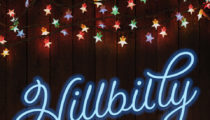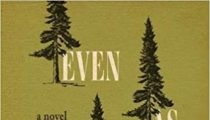Knox Thompson first crossed paths with the man who would…
Book Review: ‘Appointed Rounds: Essays’ by Michael McFee
Michael McFee. Appointed Rounds: Essays. Macon, Ga.: Mercer University Press, 2018. 224 pages. Softcover. $20.00.
“Writers wield such flimsy materials for immortality—the ink that fades, the paper that yellows or crumbles or burns, the books that waste away on dusty shelves, unread,” Michael McFee writes in “Immortality,” the final essay that closes on the most touching theme perforating his collection Appointed Rounds. McFee’s desire to be remembered and fear of being forgotten with time is one to which everyone can relate. The theme feels essential to humanity yet can also somehow feel isolating which McFee perfectly captures. Throughout the collection, there’s a tension at play between acknowledging the likelihood—and perhaps even grace—of eventual forgetting and the heart’s plea for recognition, for someone left behind who will sing praises of a life well-executed and well-written.
McFee maps onto the pages of Appointed Rounds his fears of being forgotten and desire for remembrance just as much as he maps the routes of his writing life and the North Carolina streets he has called home for a lifetime. He practices remembering the places and people he has called home the same way in which he hopes to someday be remembered, with complexity and, often, with reverence. The essays are broken into bits and pieces, sections mirroring the frequent stops of the United States Postal Service from which he takes inspiration for his title.
While McFee addresses a variety of topics in the collection, the essays are first and foremost about his writing life and how to find beauty in the surrounding world. He visits the late Reverend Billy Graham’s library in “Just As I Am Not,” and feels out of place when he notices the lack of books in the “library,” making him feel even more alienated as “a lapsed Baptist, lapsed choirboy, and lapsed architecture student who became a writer.” In “Anthologizing,” he sees his reading life as a constant picking and choosing, saving old favorites and adding “concentrated verbal worlds that have spun into view for the first time or returned for another appreciative viewing.” He finds beauty in the structure of books as physical objects throughout the first of seven sections in the collection.
McFee is, first and foremost, a poet, which is made obvious by the short sections and lyrical qualities of his essays. The essays in the collection read more like poetry than essays at times, and occasionally readers may feel bogged down on a word-by-word level, sucked into detail instead of feeling immersed in the narrative as a whole. The pages will turn quickly due to the flow of the words and the white spaces between sections playing easy on the eyes.
As a poet and essayist, McFee finds art in the everyday: in daily walks to the mailbox “pausing by the sprawling rosemary bush, which I pinch for postal good luck” in “The Mail,” in old friends in “For Doris” whose “fierce dark eyes pierced, sparkled, didn’t miss a thing,” and, most notably, in the way he wrestles words “patiently, painstakingly, deliberately” in “Proofs.” The wrestling of words will resonate with writers struggling to tame their work into something tight, something beautiful. His writing is a lesson on how to view one’s surroundings in a writerly way.
McFee’s focus on his writing life can at times feel like instructions in craft. He details the process of making a book, of receiving one’s newest publication in print, of creating a writing routine, and even feeling guilt as a writer who can work from home while his wife spends the day away at her job. Because of this, these essays will feel more relatable, more in sync with readers who also write than with those selecting a book for pure pleasure.
At his best in the collection, McFee whorls words onto the pages which will sweep readers up with their loveliness and considerate placement. However, there are moments in the collection which begin to feel a bit self-congratulatory or self-promoting. Nowhere is that more evident than in “My New Yorker.” McFee celebrates his poem “Snow Goat” published in the New Yorker, a cause for celebration and pride, to be sure. Unfortunately, dwelling on the past achievement and republishing the poem in the collection feels like too strong a push for remembrance.
As someone who shares McFee’s affinity for letter writing and receiving, my favorite essay of the collection is “The Mail,” a meditation on the personal qualities inherent in the deeply involved process of writing, sending, delivering, opening, and reading pieces of mail. A letter is a laying of soul on paper, a gift, an offering to commune with those about whom we care. He presents, here, his essays as offerings to the reader, lying in wait to be opened, read, remembered.



